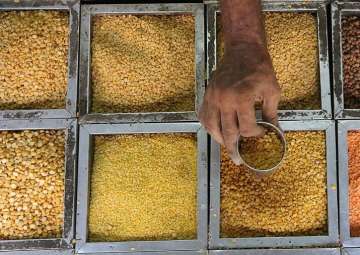India will now export surplus of "all types of pulses" to ensure that farmers receive competitive remuneration for their produce.
The decision comes after the union government on Thursday removed the prohibition on "export of all types of pulses" which was imposed due to country's import dependence for the protein-rich food item.
However, healthy production and massive buffer stock accumulated during 2016-17 brought down the import dependence for pulses substantially.
"The CCEA (Cabinet Committee on Economic Affairs) has approved the removal of prohibition on export of all types of pulses," Law Minister Ravi Shankar Prasad told reporters after a meeting of the Union Cabinet here.
He said the move will give the farmers greater choice in marketing their produce and lead to improved incomes.
Subsequently, the CCEA empowered the committee chaired by Secretary, Department of Food and Public Distribution, to review the "export or import" policy on pulses.
The committee will also consider measures such as quantitative restrictions, prior registrations and changes in import duties depending on domestic production and demand, domestic and international prices and international trade volumes.
The CCEA's rationale behind the decision stems from the fact that exports will help farmers to dispose of their products at remunerative prices and also encourage them to expand the area of sowing.
"Export of pulses would provide an alternative market for the surplus production of pulses. Allowing export of pulses will also help the country and its exporters to regain their markets," the CCEA said in a statement.
"It is expected that pulses production will be sustained in the country and our import dependence on pulses will come down substantially. This is also likely to provide higher levels of protein to the population and work towards nutritional security."
The statement further said that integration with global supply chain is also likely to help the farmers in adopting good agricultural practices and better productivity.
In 2016-17 production year, the India produced 23 million tonnes of pulses. The government alone procured two million tonnes and ensured minimum support price or market rates, whichever was higher, directly from the farmers.
The target for pulses production in 2017-18 has been fixed at 22.90 million tonnes.
Latest Business News
